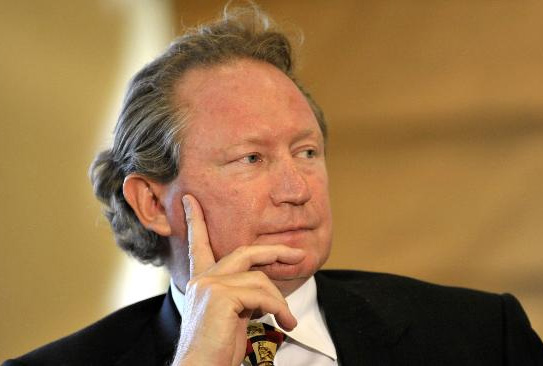



Much about Andrew Forrest is larger than life. “Twiggy”—the boyhood nickname by which Forrest is still known throughout Australia—is one of the richest men on the continent thanks to his no-holds-barred approach to business, which is currently profiting handsomely from China’s insatiable appetite for iron ore. At the same time, he has fast become one of the most generous Australians ever, giving away tens of millions of dollars in a short span and, in 2013, cosigning with his wife, Nicola, the Giving Pledge, with a promise to donate “the vast majority of our wealth” to benefit “those less fortunate, within our lifetime or at our death.”
“Wealthy people in Australia tend to give, and give very quietly,” Forrest recently said in an interview with the national radio station ABC Radio. “That is wonderful that they do that, but if they actually give and let people know, it acts as an inspiration.” In fact, a few years ago Forrest, now 52, stepped down as chief executive officer of Fortescue Metal Group (FMG), his mining behemoth, because he was devoting more than half his time to philanthropy, he said.
Although they are newcomers to the Giving Pledge, the Forrests’ commitment to helping native Australians has some history. In 2001, with a contribution of more than $90 million in company shares, they established the Australian Children’s Trust (ACT) to assist underprivileged youth. ACT’s first annual report, published in 2011-12, highlights the Forrest family’s donation of $260 million to charitable causes “committed to ending indigenous disparity, improving the lives of disadvantaged Australians, supporting the arts and education, and ending modern slavery around the world.” The Forrests also partner with other wealthy Australian entrepreneurs in underwriting projects aimed at educating, training, mentoring and employing indigenous Australians.
Separately Fortescue Metals launched the Billion Opportunities program, which set a goal of awarding $1 billion in contracts and subcontracts to Aboriginal businesses by the end of 2013. The company said it met the target ahead of schedule. Writing in Sydney’s Telegraph newspaper, Forrest himself applauded the initiative with an acknowledgement that granting Australia’s Aboriginal communities with such employment opportunities represents a shared path forward. “I’m asking governments, Aboriginal elders and businesses all to take the history-making example of Billion Opportunities and lead us all out of welfare and out of indigenous disparity,” he declared.
More recently, Forrest announced a donation of $65 million for higher education in his home state of Western Australia. According to Philanthropy Australia, which charts the country’s charitable industry, the 2013 gift was the largest of its kind in Australian history, and, as a high profile donation, it was typically Twiggy. The money will go towards a $50 million scholarship foundation for the state’s five universities and a new residential college at the University of WA.
While the Forrests’ generosity is often celebrated in Australia, critics have also questioned their philanthropy as well as the business deals that make it possible. Years ago, many Australians rallied against his falling far short of his promised delivery of relief housing to communities devastated by fatal bushfires in Victoria in 2009. Many laud the assistance while others have remained critical of his high-handed approach in dealings with indigenous communities. Early in 2014, Forrest released a review of Indigenous Employment and Training commissioned by the Australian government and has since attracted widespread criticism for his campaign to instate a cashless welfare system that would bar recipients from purchasing restricted items.
Separately, a profile published in 2013 by The Monthly, an Australian political and cultural magazine, canvassed his investments, philosophy, and philanthropy with a report that noted that “while Forrest’s $90 million in Australian Children’s Trust donations was ‘the largest exercise in philanthropy in Australian history,’ tax benefits (and some coincidental slumps in share prices) meant his true net loss was ‘probably less than $2 million.’” And a new, unauthorized biography chronicles Twiggy’s bare-knuckles approach to business deals and, in court, a casual relationship to the truth.
In that context, Forrest’s Giving Pledge letter is particularly revealing. “Australians cherish the right to accumulate capital and distribute it any way they feel,” he wrote. It may be that very attitude that lets Twiggy lead by example. Generosity “is at the absolute heart of being Australian,” said social analyst David Chalke. For Forrest, he continued, “it’s not so much giving but the encouragement of giving that is important.”
RELATED: "Deconstructing the Giving Pledge"